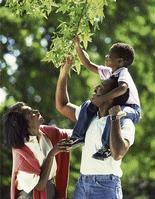Claude Wilson, Outlook Writer
Recall a local TV ad of a couple years back that began with a Texaco tanker motoring along a roadway before turning off and coming to a halt at a home address. Instantly, a door was flung open and a tender voice screamed "Daddy's home". Mom stood her ground while a little girl races toward big open arms of a father coming home after a day's work.
Soon he was tossing and tickling her, she squealed with laughter at daddy's rough-housing. Mother stood by, watching with delight and amusement, ready, not only for her own embrace, but also to calm things down.
Such scenes are uncommon in a society of absent fathers, yet their presence is very much needed in the life of their children.
How important are fathers in the life of children? Good News magazine, a faith-based publication, in an article Where Have All The Fathers Gone?, cites new studies which show fathers, who normally are not given as much credit as mothers in child rearing, actually play a crucial, inimitable role in the upbringing of children and their future success.
Anxiety in mothers
The magazine refers to a Yale University study which concludes that Daddy's horseplay, roughhousing, as occurred in the Texaco ad, which often silently annoys and cause anxiety in mothers, actually fulfils a vital role in children's social, physical and intellectual skills in school and beyond.
The study, conducted over several years, shows
conclusively that children's social, physical and intellectual development benefits greatly from the involvement of fathers. Jamaican fatherhood consultant, Dr. Percy Ricketts, adds that father care is of unique and irreplaceable nature in a way that mother care cannot replicate. "No matter what mother provides it is always in the context of motherhood. Mother cannot father."
Yale child psychiatrist, Kyle Pruett, noted that the intellectual gains [of fathering] are noticeable from the first year of life and continues on past high school.
But even before, "by eight weeks," Dr. Pruett explained in Fathernees: Why Father Care Is as Essential as Mother Care for Your Child, "infants can anticipate differences in maternal and paternal handling styles." He and his team observed that when infants were approached by their mother, they slowed and regulated their heart and respiratory rates, relaxed their shoulders, and lowered their eyelids (Achh! Mom).
Party time
But, "When the father approached, the infant's heart and respiratory rates quickened, shoulders hunched up, and eyes widened and brightened (Dad's here - party time)."
Child studies are pointing to a precept that father's playfulness helps his children develop motor skills, hand-eye coordination, balance and confidence.
Two decades of studies have indicated beyond a shadow of doubt that paternal engagement has strong positive effect on the child's cognitive function. (See findings at right).
Clearly, a man's identity as a father is inextricably linked to his practical involvement with his children. Dr. James Dobson of Focus on the Family ministry warns that while children of all ages, both male and female, have an innate need to be in contact with their fathers, boys suffer most from the absence or non-involvement of fathers.
Deadbeats should note that the U.S. National Institute of Mental Health found that fathers who were actively involved in their children's lives had fewer accidental death, fewer premature deaths, less substance abuse and fewer hospital admissions.
Some of the Yale University findings are listed below:
Both men and women use short words when talking to their infants.
Dad, however, usually replace the baby talk with bigger words and
longer sentences much earlier than mom.
When Dad teaches the child how to ride a bicycle, he offers encouragement just like Mom, but he's less likely to let his little one give up when the going gets tough, which teaches him/her how to
tolerate frustrations.
Daddy's rough and tumble
play bolster the child's confidence, assertiveness and self-control,
as well as physical fitness and
coordination.
Fathers play with kids differently, in a way that encourages them to explore and do the unexpected. Kids therefore become curious and develop problem-solving skills.
When father disciplines, he tends to emphasise the consequences of inappropriate behaviour, while mother tends to view misbehaviour as a disappointment.

